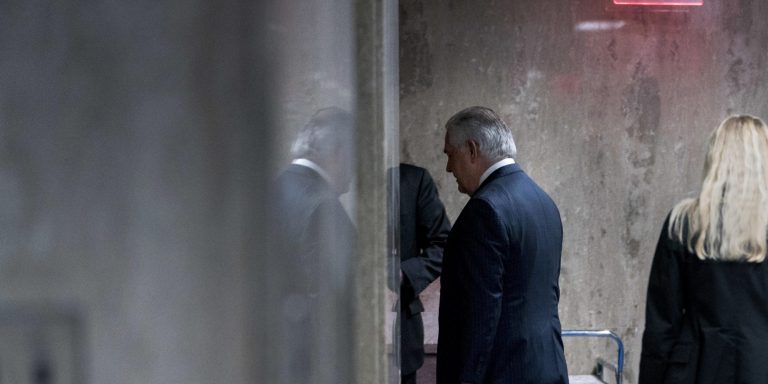INTELBRIEF
March 14, 2018
IntelBrief: Tillerson Firing and U.S. Foreign Policy

- On March 13, President Trump fired Secretary of State Rex Tillerson, saying the two had ‘a different mind-set, a different thinking.’
- Secretary Tillerson reportedly found out of his immediate dismissal when the President tweeted that he was being replaced by CIA Director Mike Pompeo.
- The moves suggest a sharp turn on many foreign policy issues, with President Trump seeking to end the obvious disconnect between the White House and several key government departments.
- The landmark Iran nuclear deal is likely in serious jeopardy, as are the prospects that North Korea would sign a similar agreement with this mercurial U.S. administration.
The growing tensions between President Trump’s White House and the State Department took a decisive turn with the long expected, but still surprising, termination of Secretary of State Rex Tillerson. On March 13, President Trump fired Secretary Tillerson via Twitter, announcing that ‘Mike Pompeo, Director of the CIA, will become our new Secretary of State. He will do a fantastic job! Thank you to Rex Tillerson for his service! Gina Haspel will become the new Director of the CIA, and the first woman so chosen. Congratulations to all!’ CNN reported that Chief of Staff John Kelly spoke to Secretary Tillerson on Friday to inform him that he would be replaced, but that the actual notification and timing came via Twitter.
The disconnect between the White House and the State Department stemmed from a range of issues, including the Iran nuclear deal (officially the Joint Comprehensive Plan of Action, or JCPOA); relocating the U.S. embassy in Israel to Jerusalem; the seeking of an equitable resolution to the Gulf Cooperation Council crisis; diplomacy with North Korea; and numerous contentious issues centered on Russia. On March 12, Secretary Tillerson spoke out strongly against Russia in its apparent use of a nerve agent in an attempt on the life of a former Russian intelligence officer in England. While the White House refused to pointedly criticize Russia for what British Prime Minster May had already denounced as Russian aggression, Secretary Tillerson was very clear, saying ‘we are outraged that Russia appears to have again engaged in such behavior. From Ukraine to Syria -- and now the UK -- Russia continues to be an irresponsible force of instability in the world, acting with open disregard for the sovereignty of other states and the life of their citizens.’ This would be Secretary Tillerson’s last public statement before the President announced his termination the next day.
The nomination of CIA Director Pompeo as the next Secretary of State is an attempt to improve the connection between President Trump and the State Department. Pompeo is a vocal critic of the JCPOA and his confirmation likely will spell the end of the agreement, which was signed in 2015 after intensive negotiations by the U.S., the U.K., Russia, China, France, Germany, the E.U., and Iran. President Trump has consistently called for the U.S. to leave the agreement, while Secretary Tillerson pushed to keep the U.S. in the agreement.
By nullifying the JCPOA, the U.S. is also likely to torpedo any upcoming talks with North Korea over its own nuclear program. It is unlikely Pyongyang would sign a nuclear agreement if the U.S. walks away from a signed agreement with Iran. As Secretary of State, Pompeo would be more aligned with President Trump’s hardline on North Korea. It remains to be seen if Pompeo’s support for the U.S. intelligence community’s assessment concerning Russia’s campaigns against the 2016 U.S. election will shift with his new position. The immediate impact of replacing Tillerson with Pompeo will be that the U.S. will present a more unified front on issues of global importance. However, the longer-term consequences of a more nationalistic U.S. foreign policy, probable under Pompeo, remain to be seen.
In the same tweet, President Trump announced that Gina Haspel was his nominee to replace Pompeo as CIA director; she would be the first woman to hold that position. Haspel is currently the number two at the agency. Her nomination is another indication that there has not been—nor will there likely ever be—a proper accounting for the atrocities committed by the agency in the years immediately after the September 11, 2001 attacks. Haspel reportedly ran a black site in Thailand where detainees were water boarded (which is considered a war crime by international law) and subjected to other ‘enhanced interrogation techniques’ that are as counterproductive as they are immoral. It is also reported that she played a significant role in the destruction of videotapes of interrogation and torture when investigations started over CIA conduct at black sites.
.
For tailored research and analysis, please contact: info@thesoufancenter.org
[video width="960" height="540" mp4="https://thesoufancenter.org/wp-content/uploads/2018/03/Final-Edit-1-150.mp4" poster="https://thesoufancenter.org/wp-content/uploads/2018/03/AP_18072682573755-1-e1521018471209.jpg"][/video]